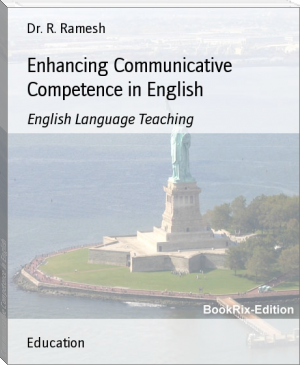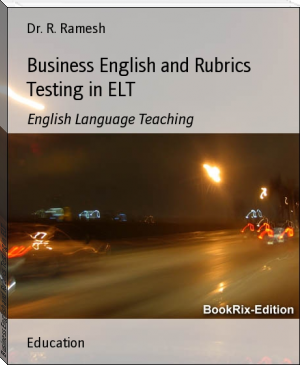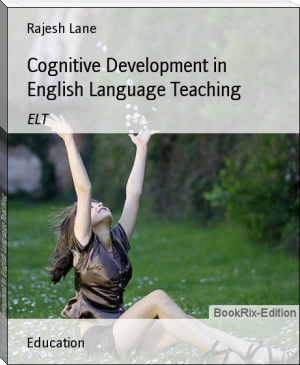Communicative Competence in English by Dr. R. Ramesh (book club reads txt) 📕

Read free book «Communicative Competence in English by Dr. R. Ramesh (book club reads txt) 📕» - read online or download for free at americanlibrarybooks.com
- Author: Dr. R. Ramesh
Read book online «Communicative Competence in English by Dr. R. Ramesh (book club reads txt) 📕». Author - Dr. R. Ramesh
CHAPTER –I
INTRODUCTION
I. Description of the title English language is closely associated with economic modernization and industrial development of most of the developing countries. Day by day, English language is gaining prominence over other regional languages. This increasing popularity of English has caused the extinction of some regional languages in the world. Today English language is gradually occupying the position of royal language among all other popular languages in the world, especially Chinese, Greek and Latin. The growing importance of English in every field of human activities demands the need to study this popular language and to handle it fairly in everyday communication. Obviously, English remains a ‘Lingua-Franca’ in India. Hence it remains essential to communicate in English language for various purposes including trade, commerce, utilizing library and day-today transaction.
The word ‘communication’ is derived from the Latin term ‘communicare’ or ‘communico’ both of which mean ‘to share’. Communication is a social phenomenon in which there is not merely transmission of meaning from one person to another but also it enables one to acquire, exchange, store, retrieve and process information for different contexts. The purpose of language learning is communication. Hubbard, etal, quoted Widdowson’s words in A Training Course for TEFL about language use as; “… when we acquire a language, we not only learn how to compose and comprehend correct sentences as isolated linguistic units of random occurrence; we also learn how to use sentences appropriately to achieve communicative purpose”(160). Longman Dictionary of Contemporary English defines the term ‘communicative’ as “able to talk easily to other people or relating the ability to communicate, especially in a foreign language”.
Today the phrase ‘good communication skill in English’ has become key word for success in every spheres of life. Communicative English involves all four language skills such as Listening, Speaking, Reading and Writing (LSRW). This project is an attempt to study the relevance of introducing communicative English at the Post Graduate level to the non-major students of Manonmaniam Sundaranar University.
II Significance of the title Post Graduation is the level at which one need to master in his subject area as well as the allied subjects connected with his/her field of specialization. Sharma,Vandana observed in her article ‘The Art of Communication’ as; “Traditional assumption about academic knowledge as an end in itself has undergone a tremendous change in the present global scenario”(40). Growing importance of English urges our present generation to equip themselves with this global language. Many professionals in multilingual and multicultural, country like India have to face with many problems when they compete with national and international firms. In India, most of the states want to preserve their regional language and they give undue importance to teaching and learning a foreign language, especially, English in schools and colleges. Though English has got the position of official language and medium of higher education in India, still our educational system allows students to write their exams in their first language, even at the P.G level. Students with poor English background prefer to write in their mother tongue, because it will help them to score high marks in their university examinations.
For the protection of first language, some state governments are supporting mother tongue as the medium of instruction. In order to support this, they provide incentives also. For e.g.; Tamil Nadu Government distributes Rs 400-/- per semester for each Tamil medium under graduate students in any discipline at college level. National Curricular Frame Work- 2005 Committee has observed that “A student may be allowed to pass without English if an alternative route for English certification and therefore instruction can be provided outside the regular school curriculum”( Muthukumaran 56). All these conditions diminished the importance of learning English language.
In an article about a workshop organized by Educational Initiatives in Bangalore noted the importance of learning and acquiring language skills. Sudhindra noted an important suggestion evolved at the end of this workshop as; “Language is definitely a key to education, but research has shown that language skills also predict success later in life. In this information age, we want all children to be able to read, understand and communicate well” (5). Today, a person’s professional career and his progress in it are largely related to his communicative skill in English. Effective communication skills are needed for our rapid changing knowledgeable society.
With the influence of globalization, many multi-national companies are conducting recruitments in developing countries. They are looking for spirited, talented graduates with excellent communication skills, especially in English. ‘Good communication skill’ or ‘flair command over English’ is the well-known slogan in our job market. When looking at the condition of ‘job fairs’, our graduates are pulling behind or feared of their lack of command over the English language. It is noted that not only engineering graduates, but also bright students from arts and science colleges are selected by multinational companies. Srinivasan and Prisccilla observed this condition in their article ‘The Future of Arts and Science Education’ as; “the mandatory study of languages has already given arts and science graduates a head-start in the communicative skills needed in today’s world” (1).
The term ‘communication skills’ involves the basic, traditional skills like: Listening, Speaking, Reading and Writing. These skills involve both productive and receptive skills. Most of our graduates in colleges and universities are good at their reading and writing skills which are called ‘paper skills’. However, they fail in their aural-oral skills, such as Listening and Speaking. This is because of the defective methods of teaching in our educational system. In order to overcome this communicative deficiency of our post graduates, it is necessary to introduce communicative English course with much emphasis on aural-oral skills rather than paper skills.
III Area of the study The researcher has selected First year Post Graduate students at Manonmaniam Sundaranar University, Tirunelveli for conducting present study. This university offers almost twenty three Post Graduate courses under regular scheme in various departments. Among these twenty three majors, some students from both arts and science subjects opted for supportive course conducted by Department of English, M.S.U. This is an inter-disciplinary course which consists of 24 students from different majors like Tamil, History, Sociology, Communication, Chemistry, Computer Application, Marine Biotechnology, Commerce, Education, Criminology and Criminal Justice, Physics and Master of Business Administration.
IV History of English Language Teaching in India English in India belongs to no region or group. Dasgupta Prabal called it as ‘auntie tongue’ among hundreds of mother tongue (Kudchedkar 70). Though English is an alien language for Indians, it has greatly helped for our freedom struggle, development and growth of our country’s economy, mutual understanding between states and countries, development of science and technology, medicine, education, industries, literature, trade and commerce, etc. Now around 350 million Indians use English daily in their life. It is India’s national and international language of trade, business, commerce, diplomacy, education, fashion, government, science and technology, etc. Now English is “India’s virtual highway to the IT and other market” (Choudhury,Shreesh).
English in Colonial India Thomas Stephenson, the first English man had arrived in India in 1580. He wrote about the wealth of India, which was monopolized by Portuguese. In 1601, London merchants formed the East India Company under the concern of Queen Elizabeth. In 1757, East India Company got a charter from Mughals for administration and revenue collection in Bengal, Bihar and Oudh. In 1857, Queen Victoria declared herself as the empress of India. Thus English speaking administrators, army officers, educators and missionaries spread English throughout India.
British government made many acts and policies for the exploitation of Indians under the name of helping them. The Chater Act of 1813 provided an annual sum of one lakh rupee for the revival and improvement of literature and encouragement of the learned natives of India for the introduction and promotion of knowledge of the science among the inhabitants of British territories in India”( Krishnaswamy and Sriraman 44-45). English Education Act of 1835, put forth by Macaulay changed the whole situation. “English became the language of government, Education and advancement, a symbol of imperial rule and of self improvement” (Krishnaswamy and Sriraman 45). The then Governor General, William Bentick accepted Macaulay Minutes and acknowledged that, “the great object of the British government ought to be the promotion of European literature and science among India and all the funds appropriated for the purpose of education would be best employed on English Education alone” (Krishnaswamy and Sriraman 45). All the funds were utilized for imparting to the native population knowledge of English literature and science through the medium of English. Through this, “Macaulay wanted to create a class of people, Indians in blood and colour, but English in taste, in opinion, in morals and in intellect” (Krishnaswamy and Sriraman 46).
Woods Despatch in 1854 was an important land mark in spreading of English education in colonial India. It emphasized the need to use both English and vernaculars for the diffusion of European knowledge. It recommended for the establishment of universities at Calcutta, Bombay and Madras in 1857.
In 1902, Indian University Commission was appointed to study the condition and improvements needed for Indian education. It has passed Indian University Act of 1904, which decided the academic and infrastructural activities of universities. It bifurcated university, high school and primary education. By 1900, most of the educational institutions in India used English as the medium of instruction.
Calcutta University Commission of 1919 recommended the bifurcation of intermediate class from universities and to establish a separate board for high schools and intermediate in every province. It also recommended that mother tongue should be used as a medium of instruction in intermediate colleges. Abbot – Wood Report (1936-7) emphasized that mother tongue should be the medium of instruction up to high school but English should be taught as a compulsory language at the high school level. Sergeant Committee of 1944 considered mainly of primary education and reiterated earlier committee’s views on language instruction. It recommended that, English should not be introduced as an optional subject in basic schools.
Various policies adopted by British government for the promotion of their diplomacy and education helped greatly for the spread of English education and this created a class of Indians with strong groundings in English.
English in Free India After independence, the question of language became emotional. Government of India accepted Hindi as the official language but oppositions from non-Hindi speaking states forced them to accept English as the Associate Official Language of India. The first education commission appointed by free India under the chairmanship of Dr. S. Radhakrishnan (1948) recommended that “English should be studied in high schools and universities in order that we may keep in touch with the living stream of ever growing knowledge” (Krishnaswamy and Sriraman 59).
Language planning in free India has started only after 1960s. ‘Anti-Hindi’ riots in South India and ‘Angrezi-Hatao’ campaign in North India urged the government to implement three language formula in schools. This means that,
One should be taught at school a. the regional language or the mother tongue when different from regional language b. Hindi or any Indian language in Hindi speaking areas. c. English or any other European language (Krishnaswamy and Sriraman 62).
Certainly the government cannot implement this uniformly because of the oppositions form some states. In 1966, Kothari Commission recommended that Hindi and English should continue as a Link Language and English should be the medium of instruction in all major





Comments (0)